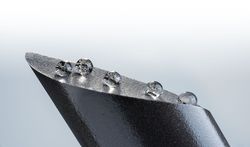It combines the high water resistance of the silicone world with the attractive material costs of the polyurethane world.
This FIP CC technology will be demonstrated live with the new DM 402 CC mixing and dosing system, in conjunction with the new polyurethane (PU) foam Fermapor® CC, at the Sonderhoff booth from October 17 through 21, 2017.
The new Fermapor® CC foam sealant system is based on polyurethane and is intended for applications requiring very high resistance to water. It closes the gap between high-priced predominantly closed-cell materials such as silicone foam, and lower-priced mixed-cell PU foam. It also offers current users of 1-component sealing technology a less expensive alternative.
Fermapor ® CC is a room temperature crosslinking 2-component system that forms a predominantly closed-cell PU soft foam seal with the newly developed FIP CC foaming process. The foam structure is comprised of very fine-cells which are dense and particularly uniform. Thanks to its closed-cell structure, the Fermapor® CC foam seal has a very high resistance to water absorption, and is 90% less air-permeable than mixed-cell PU foam. With a smooth, slightly shiny surface, the Fermapor ® CC foam seal also makes a good visual impression. In addition, it is significantly more resistant compared to conventional PU foam beads.
Even if the surface should be damaged due to the application, the water intake is only slightly affected, as proven by practical tests and laboratory tests. Fermapor ® CC PU foam fulfills the REACH / EC regulation 1907/2006 and RoHS and is used for the sealing of components as a rule at temperatures between -40 to +80 ° C, even up to +160 ° C for short periods of time.
Sonderhoff has patented a new sealing technology with the DM 402 CC mixing and dosing system for the metering of Fermapor® CC. The application process itself follows the well-known FIPFG process, which is a production standard in many industries. What is new is the sealing foam’s ability to reach its full size shortly after being applied onto the component. A process-oriented quality control can thus determine, immediately after the sealing application, whether the seal has been applied to the desired height over the entire component contour.
With the Fermapor ® CC sealing foam and the FIP CC technology, a further developed FIPFG process is now available to customers, which opens up new fields of application for automated foam sealing.

